Cocaine-induced chromatin remodeling increases brain-derived neurotrophic factor transcription in the rat medial prefrontal cortex, which alters the reinforcing efficacy of cocaine
- PMID: 20810894
- PMCID: PMC2943400
- DOI: 10.1523/JNEUROSCI.2328-10.2010
Cocaine-induced chromatin remodeling increases brain-derived neurotrophic factor transcription in the rat medial prefrontal cortex, which alters the reinforcing efficacy of cocaine
Abstract
Cocaine self-administration alters patterns of gene expression in the brain that may underlie cocaine-induced neuronal plasticity. In the present study, male Sprague Dawley rats were allowed to self-administer cocaine (0.25 mg/infusion) 2 h/d for 14 d, followed by 7 d of forced abstinence. Compared with yoked saline control rats, cocaine self-administration resulted in increased brain-derived neurotrophic factor (BDNF) protein levels in the rat medial prefrontal cortex (mPFC). To examine the functional relevance of this finding, cocaine self-administration maintained under a progressive ratio schedule of reinforcement was assessed after short hairpin RNA-induced suppression of BDNF expression in the mPFC. Decreased BDNF expression in the mPFC increased the cocaine self-administration breakpoint. Next, the effect of cocaine self-administration on specific BDNF exons was assessed; results revealed selectively increased BDNF exon IV-containing transcripts in the mPFC. Moreover, there were significant cocaine-induced increases in acetylated histone H3 (AcH3) and phospho-cAMP response element binding protein (pCREB) association with BDNF promoter IV. In contrast, there was decreased methyl-CpG-binding protein 2 (MeCP2) association with BDNF promoter IV in the mPFC of rats that previously self-administered cocaine. Together, these results indicate that cocaine-induced increases in BDNF promoter IV transcript in the mPFC are driven by increased binding of AcH3 and pCREB as well as decreased MeCP2 binding at this BDNF promoter. Collectively, these results indicate that cocaine self-administration remodels chromatin in the mPFC, resulting in increased expression of BDNF, which appears to represent a compensatory neuroadaptation that reduces the reinforcing efficacy of cocaine.
Figures
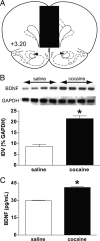
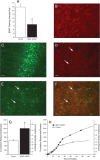

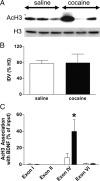
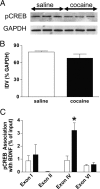
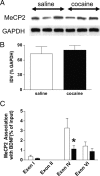
References
-
- Berglind WJ, See RE, Fuchs RA, Ghee SM, Whitfield TW, Jr, Miller SW, McGinty JF. A BDNF infusion into the medial prefrontal cortex suppresses cocaine seeking in rats. Eur J Neurosci. 2007;26:757–766. - PubMed
Publication types
MeSH terms
Substances
Grants and funding
- DA18678/DA/NIDA NIH HHS/United States
- DA024763/DA/NIDA NIH HHS/United States
- DA16824/DA/NIDA NIH HHS/United States
- F30 DA19304/DA/NIDA NIH HHS/United States
- T32 GM008541-7/GM/NIGMS NIH HHS/United States
- R21 DA018333/DA/NIDA NIH HHS/United States
- DA017543/DA/NIDA NIH HHS/United States
- DA18333-02/DA/NIDA NIH HHS/United States
- T32 GM008541/GM/NIGMS NIH HHS/United States
- R01 DA022339/DA/NIDA NIH HHS/United States
- F32 DA017543/DA/NIDA NIH HHS/United States
- K01 DA030445/DA/NIDA NIH HHS/United States
- DA22339/DA/NIDA NIH HHS/United States
- K02 DA018678/DA/NIDA NIH HHS/United States
- K01 DA024763/DA/NIDA NIH HHS/United States
- F31 DA016824/DA/NIDA NIH HHS/United States
- F30 DA019304/DA/NIDA NIH HHS/United States
LinkOut - more resources
Full Text Sources
